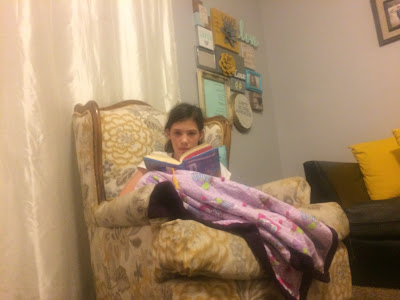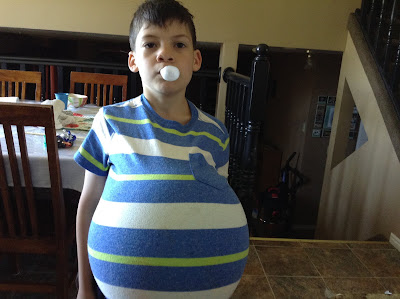 *****One asset unique to our situation is that we will not be first, second, third, or even fourth-time parents to Baby. :) We can give you an accurate idea of what to expect with the ways we will raise Baby vs. guessing or predicting based on our hopes. We have 10-years of experience as parents with 4 very different personalities. Through experience, we have come to parent differently than we did when we first became parents. We are excited for a little one to jump right in to this dynamic rather than our older children who have acted as poor lab rats to get us to this point! :) Over the years with real-life experiences, we have learned what works and what doesn't...what maintains dignity and what doesn't...what brings about change and long-term results and what doesn't. We have learned that children are resilient; however, we are excited for Baby reap the benefits of seasoned parents, a smooth family dynamic, and intentional parenting right from the start.*****
*****One asset unique to our situation is that we will not be first, second, third, or even fourth-time parents to Baby. :) We can give you an accurate idea of what to expect with the ways we will raise Baby vs. guessing or predicting based on our hopes. We have 10-years of experience as parents with 4 very different personalities. Through experience, we have come to parent differently than we did when we first became parents. We are excited for a little one to jump right in to this dynamic rather than our older children who have acted as poor lab rats to get us to this point! :) Over the years with real-life experiences, we have learned what works and what doesn't...what maintains dignity and what doesn't...what brings about change and long-term results and what doesn't. We have learned that children are resilient; however, we are excited for Baby reap the benefits of seasoned parents, a smooth family dynamic, and intentional parenting right from the start.*****
*****One asset unique to our situation is that we will not be first, second, third, or even fourth-time parents to Baby. :) We can give you an accurate idea of what to expect with the ways we will raise Baby vs. guessing or predicting based on our hopes. We have 10-years of experience as parents with 4 very different personalities. Through experience, we have come to parent differently than we did when we first became parents. We are excited for a little one to jump right in to this dynamic rather than our older children who have acted as poor lab rats to get us to this point! :) Over the years with real-life experiences, we have learned what works and what doesn't...what maintains dignity and what doesn't...what brings about change and long-term results and what doesn't. We have learned that children are resilient; however, we are excited for Baby reap the benefits of seasoned parents, a smooth family dynamic, and intentional parenting right from the start.*****
{At the Heart of How We Parent}
~We recognize our children's feelings and experiences are valid. We seek to discipline in a way that is respectful and kind to both parent and child. We don't believe in physical discipline nor the nose in the corner time out. We don't believe in shaming or threatening or manipulating. What is discipline really? We believe it is simply teaching. Why did they do what they did? What are they thinking? We want more than just different behaviors. Our goal is for our children to understand AND make different choice in the future...especially during those times when we aren't with them. We want them to grow up to be adults that know how to work through obstacles and difficulties, disagreements and conflicts...aware of themselves and others.
~We seek to connect first. Physical connection is offered if possible (a hug, a touch to the arm, an arm around a shoulder). We do our best to be inviting with our body language, facial expression, and tone of voice. If the child responds to connect and is ready (and Mom or Dad is ready too), we can talk about what happened and why plus what we can to about the current situation as well as the future. That doesn't always happen immediately.
~Since connection and waiting until the child is receptive is our goal, sometimes that means that we may need "happy time." During happy time they can do whatever they need to calm down. This may be a bath. It may be playing with something else or somewhere else with or without others. The purpose of happy time is to get out of "flight or fight" thinking. We call it being stuck in problem brain at our house. Even as adults, we know we do better when we feel better. When everyone involved feels better and our solution brain comes back, we come back together to discuss it. Why were we doing that? What were we thinking? Can we connect the misbehavior with the results? What would be a good idea for next time? If it's between two children, then help them negotiate towards an agreeable solution for all involved. The longer we have parented, the more we have learned to ask, ask, ask questions. We seek to come from a place of love. We recognize our need as parents to take care of our own "stuff" so we can be present to parent consciously rather than reacting.
~We have learned there is no "if child does/says this, then parent should do/say this" to parenting moments. We have learned to asses the situation and take the details into account before responding. What is the temperament of the child, what is my style as a parent, are they tired or hungry, what is really happening here (why am I seeing what I am seeing?), etc. Sometimes the situation may call for extra love with a simple redirection. Sometimes it may be the opposite and we really need to push a bit more. As parents to your child, this is the approach we would continue to take: to do our very best to tailor our parenting to the individual needs of the child at that time. We cannot promise we will do it perfectly, but oh, we try (and we overall get better every day too). :)
~We include our children in problem solving for family challenges. When we can offer a choice, we gladly do! If it doesn't matter, we don't make it a big deal; however, when correction is needed, we seek to do so in private and at a time the child would be receptive.
~Along these lines, we encourage feeling emotions. Sometimes it isn't the right time to feel them or process them in the moment, but we acknowledge potential feelings (i.e.---"you seem mad" or "frustrated" or "sad") and ask questions and invite for sharing. We try to coach them to understand the difference between what they are feeling and how they respond to that emotion (ie---it's okay that you are mad, but it isn't okay to hit your brother.) Sometimes the discussion happens after some happy time or sometimes even at the end of the day (or a day or two afterward). We don't believe in "sucking it up" or pretending that everything is fine if we are actually angry or hurting. We believe that it is okay to be angry or sad and seek to teach our children appropriate ways to express all emotions, including "negative" ones. We teach the connection of tuning inward to why we are feeling emotion.
~We believe in hugs and kisses. We believe in physical affection. We believe in getting down on the floor with our little children.
~We say I love you.
~We believe in geting down to their size, especially during teaching moments (AKA discipline).
~For us, experiences are more important than things. We would prefer to spend our time, energy, and finances on experiences rather than a more expensive home or car payment, more toys, etc. We seek for these experiences to be meaningful or purposeful.
~We are fiercely protective of family time and individual time with the kids. Our lives are more simple, yet, we feel, more meaningful. We prefer simple and meaningful over complicated and hollow frills or thrills.
See family traditions for more.
~We seek to connect first. Physical connection is offered if possible (a hug, a touch to the arm, an arm around a shoulder). We do our best to be inviting with our body language, facial expression, and tone of voice. If the child responds to connect and is ready (and Mom or Dad is ready too), we can talk about what happened and why plus what we can to about the current situation as well as the future. That doesn't always happen immediately.
~Since connection and waiting until the child is receptive is our goal, sometimes that means that we may need "happy time." During happy time they can do whatever they need to calm down. This may be a bath. It may be playing with something else or somewhere else with or without others. The purpose of happy time is to get out of "flight or fight" thinking. We call it being stuck in problem brain at our house. Even as adults, we know we do better when we feel better. When everyone involved feels better and our solution brain comes back, we come back together to discuss it. Why were we doing that? What were we thinking? Can we connect the misbehavior with the results? What would be a good idea for next time? If it's between two children, then help them negotiate towards an agreeable solution for all involved. The longer we have parented, the more we have learned to ask, ask, ask questions. We seek to come from a place of love. We recognize our need as parents to take care of our own "stuff" so we can be present to parent consciously rather than reacting.
~We have learned there is no "if child does/says this, then parent should do/say this" to parenting moments. We have learned to asses the situation and take the details into account before responding. What is the temperament of the child, what is my style as a parent, are they tired or hungry, what is really happening here (why am I seeing what I am seeing?), etc. Sometimes the situation may call for extra love with a simple redirection. Sometimes it may be the opposite and we really need to push a bit more. As parents to your child, this is the approach we would continue to take: to do our very best to tailor our parenting to the individual needs of the child at that time. We cannot promise we will do it perfectly, but oh, we try (and we overall get better every day too). :)
~We believe in hugs and kisses. We believe in physical affection. We believe in getting down on the floor with our little children.
~We say I love you.
~We believe in geting down to their size, especially during teaching moments (AKA discipline).



















































